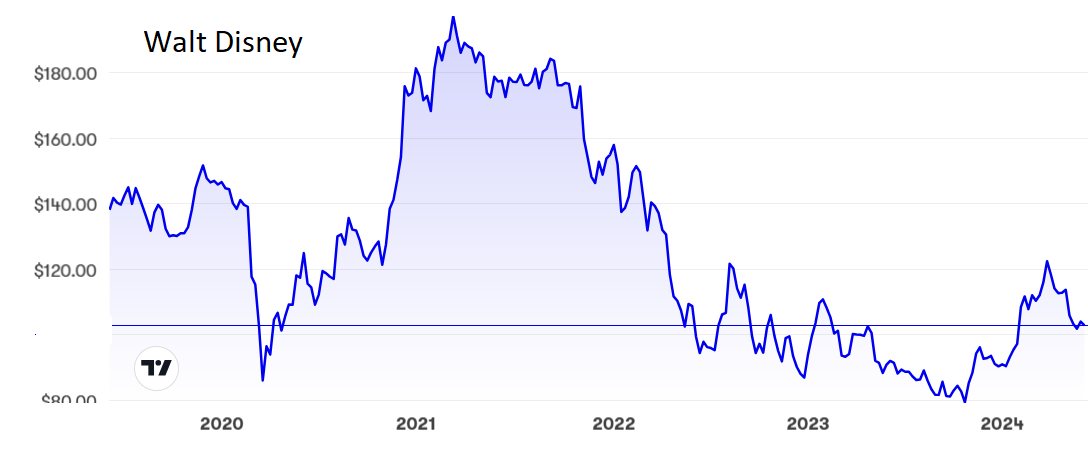Chance to buy after activist nets $1bn profit on stake sale
A decline in price following a large share sale presents an opportunity at this famous company. Overseas investing expert Rodney Hobson explains why.
5th June 2024 08:22
by Rodney Hobson from interactive investor

Having an activist investor on your back is a double-edged sword for company directors. The outside agitator keeps the board on its toes but is also a serious distraction and they may not have the wider interests of other shareholders at heart. Getting rid allows the executives to get on with the job they are paid to do but also removes the incentive to do better.
Nelson Peltz, a billionaire activist shareholder, has sold the entire $3.5 billion stake in entertainment group Walt Disney Co (NYSE:DIS) that he held through his Trian fund, after failing to convince other shareholders to vote two of his representatives on to the Disney board. He does have the consolation of making a $1 billion profit on his adventure.
- Invest with ii: Buy US Stocks from UK | Most-traded US Stocks | Cashback Offers
Peltz argued that Disney had “woefully underperformed its peers and its potential” and latest quarterly results, for Disney’s second quarter to the end of March, were indeed a mixed bag, though there were certainly more positives than negatives from an empire covering Hollywood studios, theme parks and television subscription services.
Revenue edged up just 1.2% to $22.1 billion but restructuring and impairment charges knocked a $2 billion hole in net income, which was down 85% to $216 million. That was a real pity, because otherwise the figure would have jumped from $1.5 billion to a highly creditable $2.2 billion.
The culprit was the setting up of a joint venture combining Disney’s Star India arm with the Indian operations of Reliance Industries. Without those one-off changes, earnings per share (EPS) were up 30%.
Meanwhile, the experiences division, which includes theme parks and resorts, performed strongly while the streaming business of Disney+ and Hulu at last produced an operating profit for the first time.
The Hollywood studio has produced a series of cinema box office flops, prompting Disney chief executive Bob Iger to intervene to demand fewer films but of higher quality. He has already got to work on animation studio Pixar, which is shedding 175 jobs, about 14% of its staff, to reduce costs as it returns to focusing on feature films.
The better results from theme parks, plus confidence that the video streaming service will be profitable in the final quarter to September, have prompted Disney to raise its annual guidance from a 20% rise in earnings per share to a 25% uplift from $3.76 achieved last time. Given that underlying EPS was 30% higher in the second quarter, the new target looks highly achievable.
- Global outlook for 2024: updated forecasts for S&P and UK
- US government debt is a ticking time bomb
- Sign up to our free newsletter for share, fund and trust ideas, and the latest news and analysis
That still leaves the issue of a succession plan, which was a key plank of the failed coup by Peltz. Iger was reinstated after his chosen successor Bob Chapek was ousted. Iger has promised to serve for two years at the most, more than adequate time to find a competent replacement.
Disney shares looked to be heading north of $200 just over three years ago but problems of making the streaming service profitable in the face of intense competition and a strike by screen writers and actors has taken the shine off the stock. The bottom of the market came at $80 last October, since when the shares have been as high as $122.

Source: interactive investor. Past performance is not a guide to future performance.
A recent pullback to around $103, caused mainly by Peltz dumping his holding, has opened up a buying opportunity, although the price/earnings ratio in triple figures is more than a little daunting. The yield is also miserly at just 0.3%. Clearly a massive improvement, as promised, is factored into the share price.
Hobson’s choice: I recommended Disney as a buy, with some caveats, at just below $120. Now the shares have slipped back I rate them as a buy with rather more confidence, especially as the rest of this year looks far more promising.
Rodney Hobson is a freelance contributor and not a direct employee of interactive investor.
These articles are provided for information purposes only. Occasionally, an opinion about whether to buy or sell a specific investment may be provided by third parties. The content is not intended to be a personal recommendation to buy or sell any financial instrument or product, or to adopt any investment strategy as it is not provided based on an assessment of your investing knowledge and experience, your financial situation or your investment objectives. The value of your investments, and the income derived from them, may go down as well as up. You may not get back all the money that you invest. The investments referred to in this article may not be suitable for all investors, and if in doubt, an investor should seek advice from a qualified investment adviser.
Full performance can be found on the company or index summary page on the interactive investor website. Simply click on the company's or index name highlighted in the article.
Disclosure
We use a combination of fundamental and technical analysis in forming our view as to the valuation and prospects of an investment. Where relevant we have set out those particular matters we think are important in the above article, but further detail can be found here.
Please note that our article on this investment should not be considered to be a regular publication.
Details of all recommendations issued by ii during the previous 12-month period can be found here.
ii adheres to a strict code of conduct. Contributors may hold shares or have other interests in companies included in these portfolios, which could create a conflict of interests. Contributors intending to write about any financial instruments in which they have an interest are required to disclose such interest to ii and in the article itself. ii will at all times consider whether such interest impairs the objectivity of the recommendation.
In addition, individuals involved in the production of investment articles are subject to a personal account dealing restriction, which prevents them from placing a transaction in the specified instrument(s) for a period before and for five working days after such publication. This is to avoid personal interests conflicting with the interests of the recipients of those investment articles.